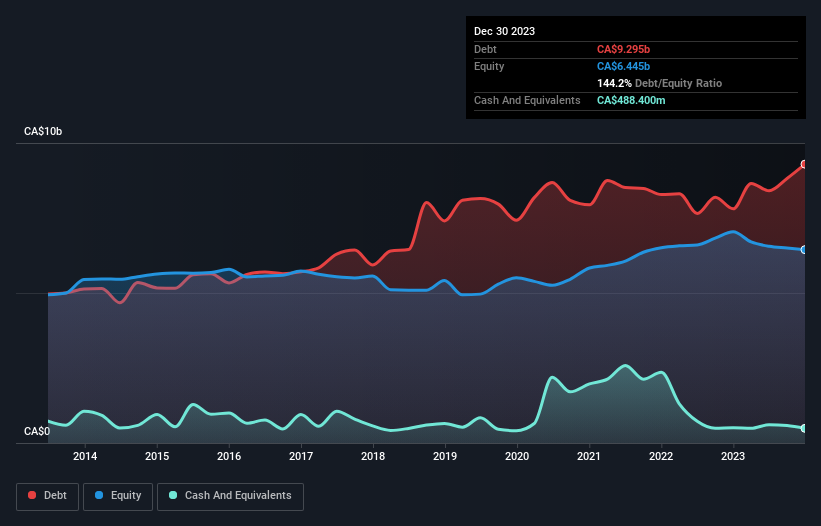These 4 Measures Indicate That Canadian Tire Corporation (TSE:CTC.A) Is Using Debt In A Risky Way

The external fund manager backed by Berkshire Hathaway's Charlie Munger, Li Lu, makes no bones about it when he says 'The biggest investment risk is not the volatility of prices, but whether you will suffer a permanent loss of capital.' So it might be obvious that you need to consider debt, when you think about how risky any given stock is, because too much debt can sink a company. Importantly, Canadian Tire Corporation, Limited (TSE:CTC.A) does carry debt. But the real question is whether this debt is making the company risky.
Why Does Debt Bring Risk?
Debt is a tool to help businesses grow, but if a business is incapable of paying off its lenders, then it exists at their mercy. If things get really bad, the lenders can take control of the business. However, a more common (but still painful) scenario is that it has to raise new equity capital at a low price, thus permanently diluting shareholders. By replacing dilution, though, debt can be an extremely good tool for businesses that need capital to invest in growth at high rates of return. When we examine debt levels, we first consider both cash and debt levels, together.
See our latest analysis for Canadian Tire Corporation
What Is Canadian Tire Corporation's Debt?
As you can see below, at the end of December 2023, Canadian Tire Corporation had CA$9.29b of debt, up from CA$7.80b a year ago. Click the image for more detail. However, it does have CA$488.4m in cash offsetting this, leading to net debt of about CA$8.81b.

How Strong Is Canadian Tire Corporation's Balance Sheet?
Zooming in on the latest balance sheet data, we can see that Canadian Tire Corporation had liabilities of CA$6.39b due within 12 months and liabilities of CA$9.14b due beyond that. Offsetting this, it had CA$488.4m in cash and CA$1.20b in receivables that were due within 12 months. So its liabilities outweigh the sum of its cash and (near-term) receivables by CA$13.8b.
The deficiency here weighs heavily on the CA$7.90b company itself, as if a child were struggling under the weight of an enormous back-pack full of books, his sports gear, and a trumpet. So we definitely think shareholders need to watch this one closely. After all, Canadian Tire Corporation would likely require a major re-capitalisation if it had to pay its creditors today.
In order to size up a company's debt relative to its earnings, we calculate its net debt divided by its earnings before interest, tax, depreciation, and amortization (EBITDA) and its earnings before interest and tax (EBIT) divided by its interest expense (its interest cover). The advantage of this approach is that we take into account both the absolute quantum of debt (with net debt to EBITDA) and the actual interest expenses associated with that debt (with its interest cover ratio).
Canadian Tire Corporation has a rather high debt to EBITDA ratio of 5.4 which suggests a meaningful debt load. However, its interest coverage of 4.0 is reasonably strong, which is a good sign. Worse, Canadian Tire Corporation's EBIT was down 32% over the last year. If earnings continue to follow that trajectory, paying off that debt load will be harder than convincing us to run a marathon in the rain. The balance sheet is clearly the area to focus on when you are analysing debt. But it is future earnings, more than anything, that will determine Canadian Tire Corporation's ability to maintain a healthy balance sheet going forward. So if you're focused on the future you can check out this free report showing analyst profit forecasts.
But our final consideration is also important, because a company cannot pay debt with paper profits; it needs cold hard cash. So we clearly need to look at whether that EBIT is leading to corresponding free cash flow. In the last three years, Canadian Tire Corporation's free cash flow amounted to 26% of its EBIT, less than we'd expect. That weak cash conversion makes it more difficult to handle indebtedness.
Our View
On the face of it, Canadian Tire Corporation's EBIT growth rate left us tentative about the stock, and its level of total liabilities was no more enticing than the one empty restaurant on the busiest night of the year. And furthermore, its conversion of EBIT to free cash flow also fails to instill confidence. Taking into account all the aforementioned factors, it looks like Canadian Tire Corporation has too much debt. That sort of riskiness is ok for some, but it certainly doesn't float our boat. There's no doubt that we learn most about debt from the balance sheet. However, not all investment risk resides within the balance sheet - far from it. For example Canadian Tire Corporation has 4 warning signs (and 1 which shouldn't be ignored) we think you should know about.
If you're interested in investing in businesses that can grow profits without the burden of debt, then check out this free list of growing businesses that have net cash on the balance sheet.
New: AI Stock Screener & Alerts
Our new AI Stock Screener scans the market every day to uncover opportunities.
• Dividend Powerhouses (3%+ Yield)
• Undervalued Small Caps with Insider Buying
• High growth Tech and AI Companies
Or build your own from over 50 metrics.
Have feedback on this article? Concerned about the content? Get in touch with us directly. Alternatively, email editorial-team (at) simplywallst.com.
This article by Simply Wall St is general in nature. We provide commentary based on historical data and analyst forecasts only using an unbiased methodology and our articles are not intended to be financial advice. It does not constitute a recommendation to buy or sell any stock, and does not take account of your objectives, or your financial situation. We aim to bring you long-term focused analysis driven by fundamental data. Note that our analysis may not factor in the latest price-sensitive company announcements or qualitative material. Simply Wall St has no position in any stocks mentioned.
About TSX:CTC.A
Canadian Tire Corporation
Provides a range of retail goods and services in Canada.
Excellent balance sheet established dividend payer.


